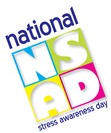Today’s post comes to you from
Mary Richards, author of the Stress Pocketbook
12th Annual National Stress Awareness Day
 Tomorrow, Wednesday 3 November, is the 12th Annual National Stress Awareness Day. Organised by the Institute of Stress Management (ISMA) their website (www.isma.org.uk) contains a balance of practical approaches and chilling statistics. It’s worth taking a look at. There are some good tips and they give some sound advice.
Tomorrow, Wednesday 3 November, is the 12th Annual National Stress Awareness Day. Organised by the Institute of Stress Management (ISMA) their website (www.isma.org.uk) contains a balance of practical approaches and chilling statistics. It’s worth taking a look at. There are some good tips and they give some sound advice.
Relax
But just to make sure that I don’t add to your stress levels today, I would prefer to leave the nitty gritty to the ISMA and choose instead to tell you a story. So relax for a moment, step down a gear; read, absorb and enjoy…
When I was about 7 years old, my grandfather took me for a walk. There was nothing unusual in this, we often went for walks. Sometimes we talked. Sometimes we walked in perfect silence, listening to the birds, feeling the winds, watching the clouds, sensing the life around us.
As we came to the edge of the village pond my grandfather stooped down and picked up a stone. ‘Here’ he said as he passed me the stone, ‘throw this into the water.’ Laughing, I threw the stone high in the air and watched as it dropped, squealed with delight as it hit the water and splashed us. I quickly bent to pick up another stone, but felt my grandfather’s hand on my shoulder.
‘Look’, he said, ‘see what the stone has done to the water. You felt the splashes, now see the ripples. Wait and watch. See how long they last. See how far and wide they spread.’
And so we stood and watched. And as we did, I heard him say ‘As you grow, remember that you are like a stone dropping into the pond of life. You will create a lot of splashes in your life, it is inevitable. But just as you are responsible for your own splashes, so you are responsible for the ripples that come from them and touch the lives of others. The splash that comes from anger will send anger out to others. The splash that comes from kindness will send kindness out to them. You always have a choice. The responsibility is yours. Remember this.’
And although in my early years, I often forgot, I find that I am increasingly reminded by some quiet inner voice, that whatever comes my way in life, I have a choice. I have a choice of how I see it, and how I respond to it. My choice can make life more difficult for myself and others, or my choice can make it easier. My choice is my responsibility.
Have a smooth day, and a stress-free week.
Management Pocketbooks you might enjoy

 Tomorrow is National Stress Awareness Day, so let’s take a look at a valuable idea from The Stress Pocketbook.
Tomorrow is National Stress Awareness Day, so let’s take a look at a valuable idea from The Stress Pocketbook.



 Tomorrow, Wednesday 3 November, is the 12th Annual National Stress Awareness Day. Organised by the Institute of Stress Management (ISMA) their website (
Tomorrow, Wednesday 3 November, is the 12th Annual National Stress Awareness Day. Organised by the Institute of Stress Management (ISMA) their website (